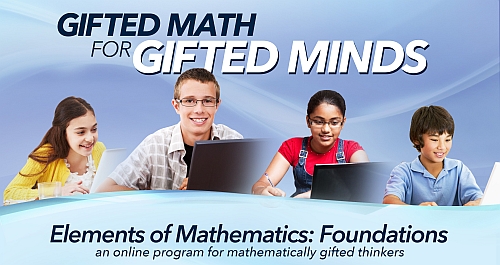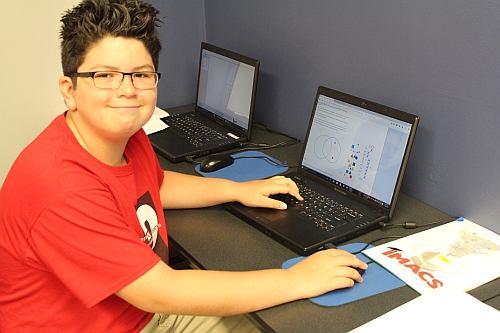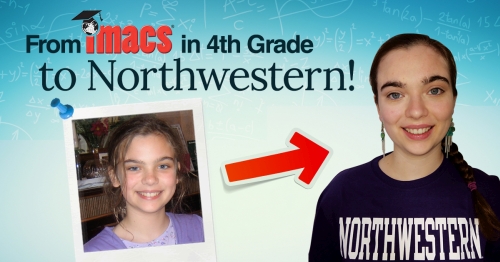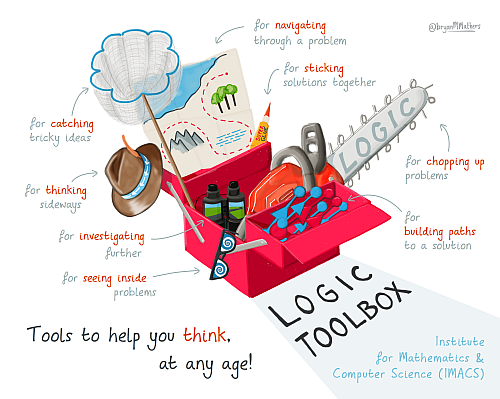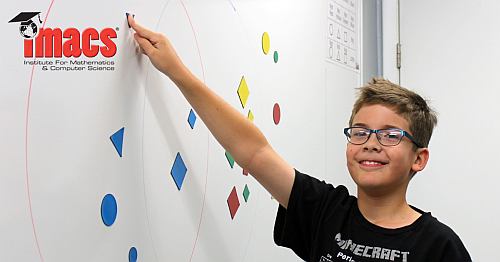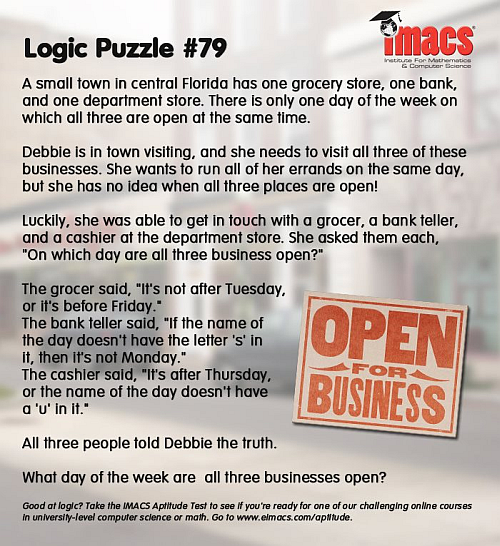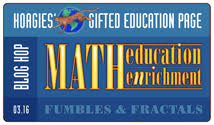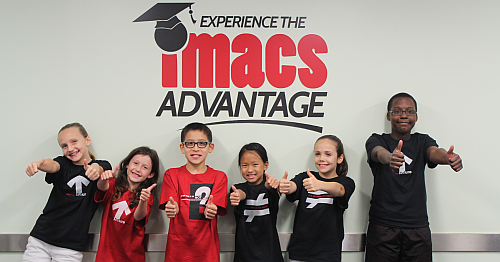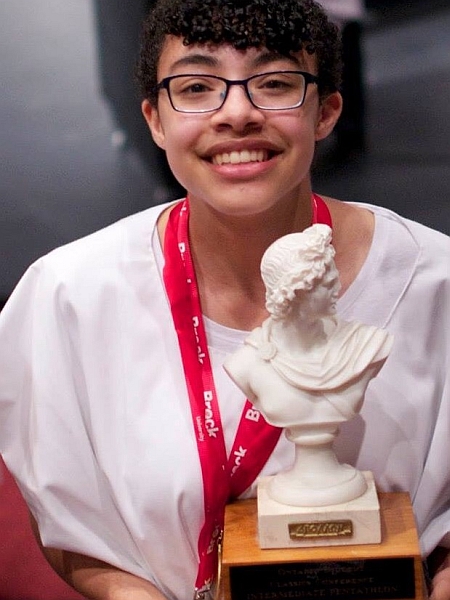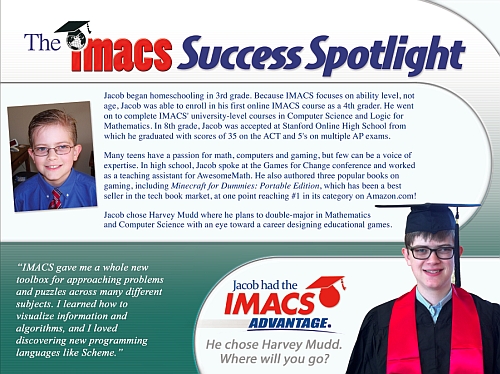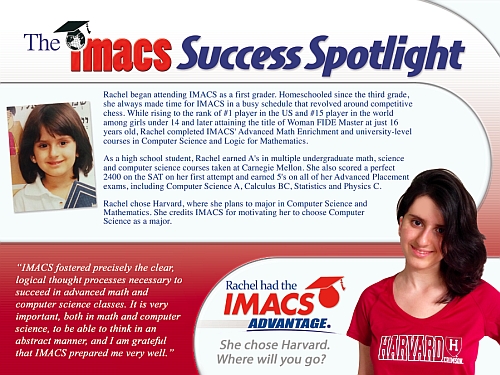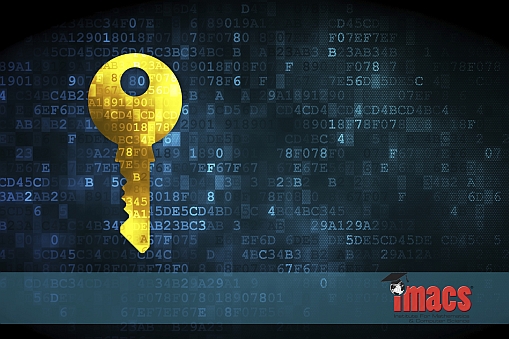
Acceleration Helps But Gifted Kids Need More
For mathematically talented children, acceleration is a commonly used approach to address their need to be challenged. While acceleration can save gifted math students from unnecessary repetition, by definition acceleration cannot go deeper than the standard curriculum, and deeper is what many of these students desperately need. Mathematically talented students deserve to be inspired by engaging curriculum, not merely less bored. Educators know this and are seeking better solutions that offer gifted math students the opportunity to study genuine mathematics with the depth and sophistication that match how their gifted minds work.
Common Characteristics of Gifted Children
The National Association for Gifted Children (NAGC) lists common characteristics of gifted children. Twelve that relate particularly to the study of mathematics are:
- Rapid learner; puts thoughts together quickly *
- Excellent memory *
- Advanced comprehension of abstract ideas
- Enjoys solving problems, especially with numbers and puzzles
- Thinking is abstract, complex, logical, and insightful
- Longer attention span and intense concentration
- Learn basic skills quickly and with little practice *
- Asks probing questions
- Highly developed curiosity
- Interest in experimenting and doing things differently
- Puts idea or things together that are not typical
- Vivid imaginations
Of these twelve characteristics, acceleration can make maximum use out of only 1, 2 and 7 to deliver a learning experience that is somewhat better than no accommodation at all. The other nine characteristics require an approach that is fundamentally different from the standard curriculum, which is designed to work with typical students.
EMF Understands Gifted Thinkers
Elements of Mathematics: Foundations (EMF) provides that fundamentally different approach. Developed by a team of mathematicians who teach gifted children, EMF was designed from scratch to leverage all 12 characteristics. The result is a curriculum that allows talented students to immerse themselves in the study of mathematics where their unique way of thinking fits naturally and is an enormous advantage to learning at the highest levels.
One of the most important aspects of EMF is that it allows students to experience the excitement and satisfaction of intellectual discovery. The standard curriculum, accelerated or not, tends to present the final result as a given to be accepted blindly. By contrast EMF emphasizes the path leading up to the result and teaches some basic techniques of logic used to get there.
EMF students are guided through thought-provoking exercises that lead them to keen observations. Then using logical and creative thinking to analyze and synthesize this information, students are able to arrive at the result themselves. This approach creates a much deeper, intuitive understanding of mathematics and is strongly aligned with how gifted children learn, especially the nine characteristics that acceleration ignores.
Gifted Math 2.0
Acceleration has been an acceptable compromise solution for gifted math students and their educators for a long time. Many gifted students, however, have long needed and deserve better. They need to learn mathematics in a way that embraces their endless curiosity and unique way of looking at the world. They need a curriculum designed specifically for the way their minds work. That curriculum is EMF.
IMACS Staff Writer @ 1:00 am
beginning her studies at Northwestern University.
Fiona first attended IMACS Hi-Tech Summer Camp when she was ten. Over the next eight years, she went on to complete IMACS’ university-level courses in University Computer Science, AP Computer Science: Java Programming, and Logic for Mathematics. Homeschooled since fifth grade, Fiona was awarded a National Merit Scholarship, named an AP Scholar with Distinction, and scored 2360 on the SAT. She is also a second degree black belt in Taekwondo and won a bronze medal at the 2013 AAU Junior Olympic Games.
As a high school student, Fiona studied four years of undergraduate, advanced undergraduate, and graduate classes in mathematics and physics at Northwestern University where she is the only student to have won the Outstanding Achievement in Advanced Mathematics Classes by a High School Student prize four years in a row. During that time, Fiona also served as a Teaching Assistant for the University of Chicago’s Young Scholars Program, a position usually reserved for undergraduates.
Fiona chose Northwestern, where she intends to major in Mathematics and Physics. She plans to pursue a career as a university professor of mathematics. Fiona directly credits IMACS for helping her to develop a deeper appreciation for and a sense of ownership of the mathematics that she learns.
“Logic and computer programming classes at IMACS taught me how to organize my thinking and break problems into solvable pieces. The natural structure of logic and computer programming allowed me to see the structure of a mathematical proof as I was writing or reading it. When I understand it at that level, I feel I can reconstruct it and use it creatively as well.”
Toolboxes are handy things to have around, especially when they are filled with useful tools. A maker might include a hack saw, hammer and soldering iron in her toolbox. A musician might include a metronome, pitch pipe and recording device in his toolbox. What would you find in the toolbox of a problem solver? Many things, to be sure, but among them is likely to be an array of logical reasoning skills.
Logic promotes clarity of thought in understanding ideas. As the complexity of our world increases, each of us will face a growing number of unfamiliar and challenging situations. The shift to a knowledge-based economy keeps progressing. The significant decisions we must make keep multiplying. People are needing to think critically more and more but with less and less time and information. In a world such as this, logical reasoning is a powerful skill that can help a person sort through the noise and think clearly. When faced with new and difficult questions, the experience of having solved hard problems with logical thinking can be the difference between a panicked "Where do I even begin?!" and a calm "Let's see where to begin."
For example, you might start by looking at the problem from different angles to see what's inside. Investigate further as you anticipate obstacles and how they might affect your analysis. Then build a mental map to help you navigate your way. What are the different paths you can take? As you develop a feel for the problem, divide it into more manageable pieces. Working your way through the pieces will likely require sideways thinking with creative approaches and capturing those tricky insights that flutter in and out of focus. Connect the dots as you build a way forward. When you've got all your pieces solved, glue them together for a complete solution!
People who learn to think logically are simply better equipped to analyze complex problems. From Brexit to antibiotic-resistant bacteria, unanticipated developments often lead to unprecedented situations that leave many smart, experienced people wondering what to do. Solving problems does not stop at the schoolhouse door. It is when you step into the "real world" that, if you are fortunate, the most interesting and difficult problems present you with opportunities throughout your life to make a meaningful difference. What will be in your child's toolbox when those opportunities arise?
Logic is the systematic study of reasoned argument. Why study logic? For students planning to take university-level math courses, which typically involve reading and writing proofs, the benefits are evident. But even for students heading in a different direction, developing strong logical reasoning skills has benefits too.
Logic Supports Learning Mathematics
Few would dispute that arithmetic is a fundamental base upon which the successful learning of math is built. Consequently, the development of arithmetic skills receives enormous attention in elementary school. Logic is equally fundamental to learning all other areas of math but is rarely taught in elementary school. Were students to develop a strong foundation in logic at a young age, their capacity to understand middle and high school math would be greatly enhanced.
In arithmetic, we learn how to combine or break apart numbers in order to proceed from the information given to the answer sought. If we bake three dozen cookies, multiplication tells us how many cookies we have in all. If 17 cookies are left, subtraction tells us how many were eaten. Honing arithmetic skills in elementary school allows students to quickly and accurately call upon them later, thereby making it is easier to learn more advanced math in the future.
Logic is a similarly powerful and essential tool for learning more advanced math. Whereas arithmetic is used in constructing and deconstructing information that is numeric in nature, logic is essential in constructing and deconstructing assertions that are mathematical in nature.
Students typically encounter a weak version of proofs and logic for the first time in high school geometry. But by then, pre-algebra and elementary algebra have already been taught as mostly procedural rules and algorithms to accept at face value. As a result students do not develop a genuine understanding of the derivation of those rules and algorithms and why they work. By the time students reach high school, their natural curiosity about mathematical ideas has been reduced to a hard-to-break habit of memorizing and applying rules blindly.
A worthy goal of the Common Core math standards is to develop mathematical understanding in addition to procedural skills. True mathematical understanding comes with seeing how knowledge is pieced together step-by-step on the path to deriving an important result. This is similar to what we know about developing scientific understanding in young minds — hands-on projects make learning stick better than memorizing facts. Math’s version of "hands-on" is your brain working its way through the reasoning that mathematicians followed in order to provide us with neat and tidy rules.
With a strong foundation in logical reasoning, students would have the key analytical tool needed to work their way successfully through the reasoned arguments that lead to the rules. Some may even wish to achieve the deepest understanding by using logic to independently derive the mathematical truths they were once asked only to memorize.
Logic Supports Complex Problem Solving Beyond Mathematics
The amazing thing about logic is that it makes us better thinkers and problem solvers well beyond mathematics. Computer science could not exist without logic. If you want to understand the underlying principles and algorithms and be able to apply them in any programming environment, you must understand logic. Engineering disciplines rely on logic too, especially electrical engineering as any Minecrafter worth her redstone will tell you. The entire practice of law is founded upon reasoned argument, which is why the LSAT has sections on logical reasoning and analytical reasoning.
People who learn to think logically are better at analyzing complex problems. Mathematics, with its diversity of complex problems, is a natural thought playground for developing logical thinking skills. The first steps in solving any math problem are assessing the situation and coming up with a plan of attack. Can you view the larger problem as a combination of more manageable cases? Can you take what you know and derive what you need to know? Would additional information lead you to certain conclusions? Answering these types of questions requires logical thinking.
People who learn to think logically are also better at assembling solutions. Once you have assessed the problem, broken it down, and gathered the necessary information, how do you put it all together to arrive at a solution? When faced with a novel situation, can you devise an approach where there was not one before? As the pace of change in our world accelerates, every field increasingly needs people who can strongly grasp core concepts and combine them sensibly to solve any problem, especially unfamiliar ones. Learning to apply logical thinking to mathematical situations is excellent training for handling complex problems, no matter which college major or career you choose.
Logic has a way of promoting clarity of thought in understanding ideas that were previously unfocused or muddled. Whether you are planning on becoming a professional mathematician or just trying to get through math homework on your way to a different intellectually demanding career, there is no doubt that strong logical reasoning skills would ease your path.
This blog article is part of the Hoagies' Gifted Education Page March 2016 Blog Hop on Math Education Enrichment. Please click on the Blog Hop image above to learn more about Math Education Enrichment from other Hoagies' Blog Hop participants.
—Keith Devlin, Professor of Mathematics, Stanford University
Several of our Math Enrichment parents have asked why IMACS wasn’t mentioned in The Atlantic’s recent article entitled "The Math Revolution". Well, we’re the first to admit that we’re not sexy! To journalists, that is. Or rather what we do isn’t sexy, especially when compared to the panache of producing math competition winners. But we believe in what we do, which is more than just math. IMACS prepares children to be better thinkers for life. And after twenty-three years of seeing our approach succeed, we wouldn’t change for all the media coverage in the world.
For readers unfamiliar with IMACS, we specialize in mathematics and computer science for bright, talented and gifted K-12 students. The core of our program is our Mathematics Enrichment curriculum for elementary school students, which is taught at 29 locations throughout the US. IMACS Math Enrichment is unique in that it is intentionally designed to be completely different from school math. One might say it’s "mathematician" math because it teaches even our youngest students about beautiful and powerful mathematical structures studied by professional mathematicians and typically not introduced until college.
Why do we take this approach instead of starting with what kids have already seen and expanding on it? (It sure would be a lot easier on us to market curriculum that parents recognize and that journalists think they can write about!) This goes back to the overarching purpose of everything we do — making better thinkers for life. We’re not just about turning good math students into even better ones, although we do that. We’re not just about providing gifted students with an outlet for their creative mathematical thinking, although we do that a lot. We’re not just about teaching problem-solving skills, although we certainly do that. IMACS is about teaching children how to think in creative, logical and flexible ways that will benefit them throughout their lives, whether within or outside the mathematical arena. We equip them so that, long after they have left our classrooms and entered into the "real world", they will be able to react intelligently and constructively to problems and situations that no one alive today has even imagined.
How do you learn to face those kinds of novel situations? Not by working on problems that look familiar. As IMACS alumnus Zachary Kaufman put it, "Graduate school at Stanford was so much easier with the logical thinking skills I learned at IMACS. While classmates tried to memorize each type of problem, I was able to strongly grasp core concepts and use them to solve any problem, even if it was different from those I had seen." Zachary is a better thinker for life. Or alumna Rachel Cuozzo: "An MIT degree says to the world that you are capable of complex problem solving and abstract thinking. IMACS gave me a jumpstart on my MIT education, as it taught me to exercise the same parts of my mind that I use now on a daily basis." Rachel is a better thinker for life. This is what IMACS is about. Unfortunately, it doesn’t always make good copy in an article about math whizzes.
Furthermore, IMACS has never been only for kids who already excel at math or families seeking a challenging math education for their gifted children. Of course, the majority of our students are very mathematically talented, and they happily attend our Math Enrichment classes or take our online math courses. But IMACS also nurtures bright students with untapped abilities whose prior negative experiences turned them away from math. Usually, they have been misled into thinking that being good at math means calculating quickly, scoring high on standardized math tests, or enjoying math competitions. For many talented students, none of those apply. IMACS is able to take those kids — who often have natural talent for math expressed in other ways, such as a love for games, puzzles and patterns — and show them (1) what it means to be genuinely good at math and (2) how incredibly good at math they truly are. IMACS makes them, too, better thinkers for life.
So if you are a current IMACS parent wondering if you’re missing out on something, or if you are a prospective parent considering IMACS, we encourage you to confirm that the math enrichment providers you are considering actually live up to their claims. Some will tell you that they go beyond what schools do. Some will tell you that they don’t do "drill and kill". Verify for yourself. Ask to observe a class and to see samples of the curriculum. Does it look familiar? Is it largely similar to what schools already teach? That will tell you a lot about whether your child’s mind is going to be expanded as much and in ways that you’re hoping for and quite possibly paying for.
Last New Year’s Eve, Mary, Nancy and Peter each made a different resolution about desserts.
- One of them said "No ice cream."
- One of them said "All of my desserts will have fruit! (That makes it healthy, right?)"
- One of them said "No chocolate."
In January, the three friends went out to eat three times. Loving social media, they each declared their dessert choice online during the meal. During each meal …
- exactly one person kept his or her resolution and was honest about it,
- exactly one person broke his or her resolution and was honest about it, and
- exactly one person broke his or her resolution and lied about it.
Over the three meals, each person took each action once. Here were their declarations:
| Mary | Nancy | Peter | |
| At Meal #1 | peach cobbler | apple pie with vanilla ice cream | chocolate ice cream |
| At Meal #2 | chocolate covered strawberries | plum pudding | peach cobbler |
| At Meal #3 | apple pie with vanilla ice cream | chocolate cake | cheesecake |
For each person, what resolution was made?
Try your best before looking at the solution to this year’s IMACS Holiday Logic Puzzle.
as she holds the trophy for winning the Intermediate Pentathlon prize
at this year’s Ontario Student Classics Conference.
This week, the IMACS Blog visits with eIMACS student Shuli Jones. Shuli is one of our star students, having excelled in our university-level computer science courses since the 6th grade. She recently attained the highest score possible on the AP Computer Science A test exam as a high school freshman. A multitalented young lady with a passion for programming, Shuli is well on her way to a bright future.
Please tell our readers a little bit about yourself and what you enjoy doing.
My name is Shuli Jones. I’m fifteen years old, and I’m currently a sophomore in high school. In my spare time, I like to participate in a variety of activities: I love to read, I do archery recreationally, I’m part of a trivia team and a classics society at my school, and, of course, I love programming. I’m also interested in learning new languages, coding and otherwise!
You’ve done some amazing things already at a young age. Tell us about the accomplishments and experiences of which you are most proud.
In recent memory, the thing I am the most proud of is scoring a 5 on the AP Computer Science A test. I took it while still a freshman, so it was my first AP test and I was very nervous beforehand. However, eIMACS had prepared me unbelievably well, and that, combined with my own hard studying, meant the test was nowhere near as hard as I expected. When the results came in, both my parents and I were really pleased.
Something else I’m proud of is my performance in my school’s classics society. Every year in May, we participate in the Ontario Student Classics Conference. This is a three-day competition with numerous other schools that tests knowledge of Latin grammar and vocabulary, as well as Roman life, mythology, and history. For me, this was my biggest commitment during the school year, and it’s something that I love to do. I put in many, many hours of hard work studying and working on projects with my team members, and it paid off.
My team won the Phyllis Morgan Trophy for Overall Excellence, which is typically regarded as the "top" trophy at the conference. I won several individual awards in the Intermediate category (for those having taken two years of Latin): First in Pentathlon, for having the best overall score on the five main events (notably with a first in Latin Derivatives), and first in Latin Oral Reading. I was also part of a group of four students who came second in Quaerite Summa ("Reach for the Top"), which is a quiz-bowl style competition based solely on Roman life. It felt great to get recognition for my work on something I love so much.
How did you become interested in computer science?
When I was in sixth grade, I spent Spring Break at a Girls Learning Code camp. They had partnered with eIMACS to give away a scholarship for the first eIMACS programming course, University Computer Science I. To apply for the scholarship, I took the eIMACS Aptitude Test. The test was interesting and challenging, so my parents said they would sign me up for the course. From there, my interest only increased. I’ve taken three eIMACS courses now, and each one has introduced me to new programming languages, topics, and ideas.
What do you enjoy most about the eIMACS computer science courses?
I have to say, the thing that appeals to me the most about these courses is their rigor. I can tell a lot of care was put into creating them: the information is always laid out in a logical sequence, and the learning curve is perfect. Assignments are usually just the right difficulty level to leave me challenged but not frustrated. At the same time, the programming that I’m learning is very in-depth; I feel that I’m being prepared very well to succeed in the rest of the coding world. I especially liked the variety of languages that eIMACS introduced me to (Scheme, Haskell, Python and Java), as well as the focus on "good" programming and not just on getting things done.
What are some ways in which your eIMACS experience has had a positive effect on your academic and non-academic pursuits?
Completely thanks to the knowledge I gained from my eIMACS courses, this past summer I was offered my very first paid programming internship. It was a great opportunity to learn more about the outside world of programming (and the endless debugging that real coders must carry out!). The courses I’ve taken through eIMACS have also greatly increased my capacity for logical analysis and thought; I often find myself applying the programming principles I’ve learned to my schoolwork and assignments. Additionally, eIMACS has had a positive effect on my life overall. I’ve been participating in their courses for three years now, and they have broadened my mind and introduced me to new things I might never have experienced otherwise. I’m so happy that I chose to learn computer science through eIMACS.
What kinds of things do you see yourself doing in the future?
I’m not sure yet. I know that I want to work in a STEM field, and right now my thinking is that I’d like to do something with engineering — perhaps be a mechanical engineer? I want my job to be something that lets me create new things and leave my mark on the world. Whatever that may be, I know eIMACS has helped to prepare me by giving me a solid grounding in programming and logical thought.
Jacob began homeschooling in 3rd grade. Because IMACS focuses on ability level, not age, Jacob was able to enroll in his first online IMACS course as a 4th grader. He went on to complete IMACS’ university-level courses in Computer Science and Logic for Mathematics. In 8th grade, Jacob was accepted at Stanford Online High School from which he graduated with scores of 35 on the ACT and 5’s on multiple AP exams.
Many teens have a passion for math, computers and gaming, but few can be a voice of expertise. In high school, Jacob spoke at the Games for Change conference and worked as a teaching assistant for AwesomeMath. He also authored three popular books on gaming, including Minecraft for Dummies: Portable Edition, which has been a best seller in the tech book market, at one point reaching #1 in its category on Amazon.com!
Jacob chose Harvey Mudd where he plans to double-major in Mathematics and Computer Science with an eye toward a career designing educational games.
“IMACS gave me a whole new toolbox for approaching problems and puzzles across many different subjects. I learned how to visualize information and algorithms, and I loved discovering new programming languages like Scheme.”
Rachel began attending IMACS as a first grader. Homeschooled since third grade, she has always made time for IMACS in a busy schedule that revolved around competitive chess. While rising to the rank of #1 player in the US and #15 player in the world among girls under 14 and later attaining the title of Woman FIDE Master at just 16 years old, Rachel completed IMACS’ Advanced Math Enrichment and university-level courses in Computer Science and Logic for Mathematics.
As a high school student, Rachel earned A’s in multiple undergraduate math, science and computer science courses taken at Carnegie Mellon. She also scored a perfect 2400 on the SAT on her first attempt and earned 5’s on all of her Advanced Placement exams, including Computer Science A, Calculus BC, Statistics and Physics C.
Rachel chose Harvard, where she plans to major in Computer Science and Mathematics. She credits IMACS for motivating her to choose Computer Science as a major.
“IMACS fostered precisely the clear, logical thought processes necessary to succeed in advanced math and computer science classes. It is very important, both in math and computer science, to be able to think in an abstract manner, and I am grateful that IMACS prepared me very well.”
Related Blog Posts:
The Institute for Mathematics and Computer Science (IMACS) recently released its first online algebra course, Algebra: Groups, Rings and Fields. This is the tenth course in the Elements of Mathematics: Foundations (EMF) program for talented secondary school students. Our latest self-paced offering has generated a fair amount of inquiries from parents seeking options for their mathematically advanced child. The answers to some of those questions can be found in the FAQ at EMFmath.com. IMACS responds to others, which have been consolidated by topic, in this week’s blog post.
Q: My child aced pre-algebra and is ready for algebra. Why can’t I just enroll her in the first EMF algebra course?
When people use the term “algebra,” they’re usually talking about high school algebra or what mathematicians call “elementary algebra.” By contrast, EMF teaches the kind of algebra that a mathematics major at university learns called “abstract algebra.” A student who has mastered pre-algebra is, no doubt, ready for high school algebra. However, this same student, no matter how talented, is simply not ready to jump directly into abstract algebra.
Why? Just as success in high school algebra is built on the foundation laid by elementary school math up through pre-algebra, success in abstract algebra requires a strong foundation in various mathematical structures and reasoning techniques that are rarely taught outside of a university setting. This important foundation is built up through the first nine courses of the EMF program. In fact, one might think of these early courses as constituting “pre-abstract algebra.” As such, they are an integral part of the EMF program and essential to success in the later courses.
In case you’re wondering, students who complete the EMF algebra courses will have learned all of elementary algebra and be able to solve any high school algebra problem with ease. But they will also have learned a great deal more and be well-prepared to study the high-level mathematics that is at the heart of important disciplines such as particle physics and cryptography.
Q: What if my child already took high school algebra and geometry? Is there anything left for him to learn in EMF?
As IMACS principal founder and EMF co-author, Burt Kaufman, once wrote, “It is surely a sad state of affairs that in the traditional high school curricula, the student encounters very few, if any, mathematical ideas that postdate the seventeenth century. … It would be ludicrous if an English curriculum for the high school never contemplated confronting the student with a piece of literature written after Shakespeare.”* That’s one key reason why the EMF curriculum was created—to teach modern mathematics to talented, young students who are capable of benefiting from advanced material that goes beyond the outdated math curricula used in schools.
Naturally, more experienced students will find some of the EMF material familiar, but EMF approaches these topics from a far more sophisticated standpoint. Between the new mathematical structures and techniques for reasoned argument that they will be learning, there is much for these students to gain in EMF if they are motivated to learn real mathematics as opposed to just school math.
Q: We tried other math programs for advanced kids, but they just seemed to be about going faster or preparing for competitions. That’s not working for our son who’s more of a deep thinker. I’ve heard that EMF takes a different approach. Can you explain?
First, a pair of quotes:
—Jim Simons, Mathematician and Founder of Renaissance Technologies
—Jo Boaler, Professor of Mathematics Education, Stanford University
The competition-inspired approach to math has its merits. But it’s hardly the only approach worthy of mathematically talented kids. The gifted population is filled with individuals who have exceptional talent and prefer to take their time. EMF is an ideal option for these students because the program is self-paced and encourages patience in coming to a deeper understanding of complex and beautiful ideas. At the same time, we’ve had numerous EMF students who also enjoy and excel at competition math. In fact, in situations where speed is of the essence, the non-standard mathematics to which EMF students are exposed gives them a distinct advantage over others who are seeing these ideas for the first time during a competition.

EMF algebra students will have a head start in the mathematics of particle physics.
Q: You say that EMF is “mathematician math,” and that it’s taught the way a math major at university would be taught. That’s nice, but what are the benefits for a talented child who has no interest in being a math major, let alone a mathematician?
Before your child writes off being a math major completely, especially if that choice is based on experiences with school math, consider the following:
—Keith Devlin, Professor of Mathematics, Stanford University
Whether your child decides to pursue a math major or not, there are several important skills that the EMF approach to mathematics teaches. As with all IMACS programs, EMF fosters the development of logical reasoning skills in young students. While some people believe that logic is cold and inhibits creativity (think: Star Trek’s Spock!), our experience teaching the EMF curriculum over the past 30+ years suggests otherwise. To the contrary, we have found that when IMACS students are equipped with the logic skills to construct their own well-reasoned arguments and critique those of others, the clarity of thought that this produces unleashes creative and innovative ideas that were previously unfocused or muddled.
Which brings us to how EMF encourages creative thinking. As Professor Devlin reminds us, mathematics is a creative discipline. The fact that what passes as “math” in schools is devoid of creativity should not be taken as evidence that true mathematics is indifferent to creative thinking. School math tends to take a “tell-then-drill” approach where the teacher states a rule and then students apply the rule to umpteen haphazard problem sets. By contrast, EMF uses carefully constructed exercises and interactive technology to guide students to their own “discovery” of mathematical results. To be successful in EMF, a student simply must think creatively in order to cross the bridge from keen mathematical observations to the “A-ha!” moments of intuitive understanding. And when these moments happen, the joy and pride of having climbed the intellectual mountain are profound.
Another skill that EMF promotes is abstract thinking. Imagine a world in which most jobs involve people interacting with tangible objects in the present. Perhaps you envisioned the Industrial Revolution, a time when mechanical inventions led to an explosion in manufacturing. Today, we find ourselves amidst a Knowledge Revolution wherein technological inventions mean that well-paying jobs require abstract thinking about intangible ideas such as code. This is obviously true in tech, but because tech touches every industry now, it’s also true for wide-ranging fields from medicine to music to law to film. It’s the question on many people’s minds: Are you going to design and program the robot, or will you be replaced by the robot? Whatever career your child pursues, he or she will almost certainly need to think abstractly. Abstract thinking is fundamental to the study of genuine mathematics, which is what EMF teaches.
Is EMF right for your child? IMACS created a 30-minute, online Aptitude Test to help prospective parents and students answer this question. Register to take the FREE test at EMFmath.com.
* Kaufman, Burt, Jack Fitzgerald, and Jim Harpel. MEGSSS in Action. St. Louis: CEMREL, Inc., 1981.
« Newer Posts — Older Posts »







